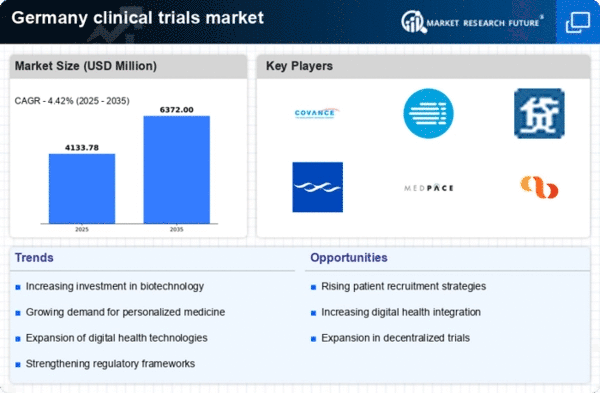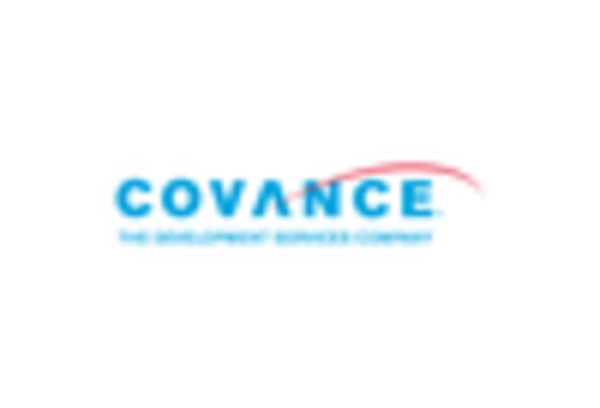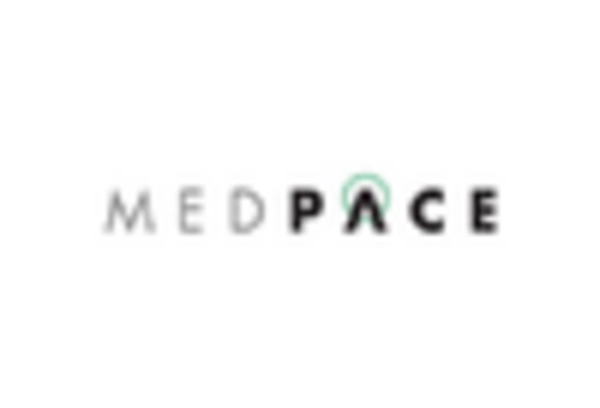Regulatory Support for Clinical Research
Regulatory bodies in Germany are increasingly supportive of clinical research, which is positively impacting the clinical trials market. The Federal Institute for Drugs and Medical Devices (BfArM) has streamlined approval processes, reducing the time required for trial initiation. In 2025, it is anticipated that the average time for regulatory approval will decrease by approximately 20%, facilitating faster access to new treatments for patients. Additionally, the introduction of adaptive trial designs is gaining traction, allowing for modifications based on interim results. This regulatory flexibility is likely to encourage more companies to conduct trials in Germany, thereby enhancing the overall landscape of the clinical trials market.
Increasing Demand for Innovative Therapies
The clinical trials market is witnessing a surge in demand for innovative therapies, particularly in the fields of oncology and rare diseases. In Germany, the prevalence of chronic diseases is rising, prompting pharmaceutical companies to invest in research and development of novel treatments. According to recent data, the market for oncology drugs alone is projected to reach €10 billion by 2026. This growing demand is driving an increase in clinical trial activities, as companies seek to validate their innovative therapies through rigorous testing. Consequently, the clinical trials market is likely to expand, with more trials being initiated to meet the needs of patients and healthcare providers.
Collaboration Between Academia and Industry
The collaboration between academic institutions and the pharmaceutical industry is fostering innovation within the clinical trials market in Germany. Universities are increasingly partnering with biotech firms to conduct cutting-edge research, leveraging academic expertise to advance clinical trials. This synergy is expected to enhance the quality of research and expedite the development of new therapies. In 2025, it is projected that collaborative trials could account for up to 40% of all clinical studies conducted in Germany. Such partnerships not only facilitate knowledge transfer but also provide access to funding and resources, thereby strengthening the clinical trials market and promoting a culture of innovation.
Technological Advancements in Clinical Research
The clinical trials market in Germany is experiencing a notable transformation due to rapid technological advancements. Innovations such as artificial intelligence (AI) and machine learning are streamlining trial processes, enhancing patient recruitment, and improving data analysis. In 2025, it is estimated that the integration of these technologies could reduce trial timelines by up to 30%. Furthermore, the adoption of electronic data capture (EDC) systems is becoming increasingly prevalent, allowing for real-time data collection and monitoring. This shift not only increases efficiency but also enhances the accuracy of trial results. As a result, stakeholders in the clinical trials market are likely to invest heavily in technology, which could lead to a more robust and efficient research environment in Germany.
Growing Patient Engagement and Recruitment Strategies
Patient engagement is becoming a critical focus within the clinical trials market in Germany. As awareness of clinical trials increases, more patients are willing to participate, which is essential for the success of research initiatives. Innovative recruitment strategies, such as digital outreach and community engagement, are being employed to attract diverse patient populations. In 2025, it is estimated that patient recruitment rates could improve by 25% due to these strategies. Enhanced patient engagement not only accelerates recruitment but also improves retention rates, ultimately leading to more successful trial outcomes. This trend is likely to shape the future of the clinical trials market, making it more patient-centric.
















